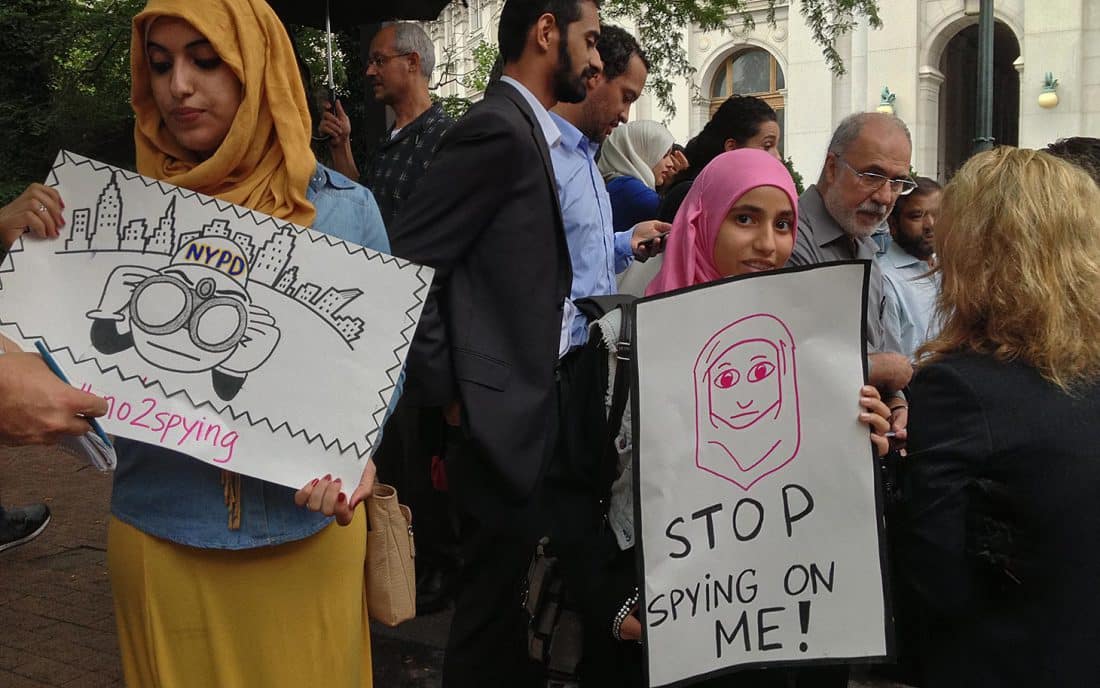Last week, in Hassan v. New York, the Third Circuit Court of Appeals reversed a lower court and held that a lawsuit may move forward against the NYPD for spying on Muslims. The plaintiffs filed the lawsuit against the NYPD for discriminating against them as Muslims in violation of the First Amendment right to freely exercise religion, the First Amendment right to be free from establishment of government religion, and the Equal Protection Clause of the Fourteenth Amendment. They seek expungement of any unlawfully obtained records pertaining to them, a judgment declaring that the NYPD has violated their First and Fourteenth Amendment rights, and an order enjoining their future discriminatory surveillance.
The plaintiffs provided significant details about the spying practices of the NYPD. Among the techniques that it employs against the plaintiffs are taking pictures, taking video, and collecting license plate numbers of mosque congregants; mounting surveillance cameras on light poles, aimed at mosques, which officers can then control remotely with their computer, and which generate footage used to help identify worshippers; sending undercover officers, some of which are called “mosque crawlers” and “rakers,” into mosques, student organizations, businesses, and neighborhoods that NYPD believes to be heavily Muslim; monitoring sermons and conversations in mosques; and surveilling locations such as bookstores, bars, cafes, and nightclubs to document American Muslim life in painstaking detail and report back to the NYPD. The spying practices have terrorized Muslims: attendance at mosques is dropping because worshippers are afraid to practice their faith openly and get stigmatized as terrorists by police; Muslim businesses are suffering losses and Muslim home-owners are seeing the value of their homes decline once photographs of these businesses and homes are associated with the NYPD’s “terrorism” investigation; and fewer Muslims are getting involved in religious student organizations. Notably, although it has been operating for over ten years, the NYPD’s spying program has not generated a single lead for a criminal prosecution.
The appeals court first rejected the NYPD’s argument that the case should be thrown out on grounds that the plaintiffs do not have standing to sue because they have suffered no injuries. The court found that “the indignity of being singled out by a government for special burdens on the basis of one’s religious calling is enough to get in the courthouse door.” The court analogized the indignities suffered by the plaintiffs to the indignities suffered by African-American school children in segregated schools, as discussed in the Supreme Court’s 1954 decision in Brown v. Board of Education: “To separate children from others of similar age and qualifications solely because of their race generates a feeling of inferiority as to their status in the community that may affect their hearts and minds in a way unlikely ever to be undone.”
The court next addressed the plaintiff’s Equal Protection Clause argument. The Equal Protection Clause of the Fourteenth Amendment mandates that “[n]o State shall . . . deny to any person within its jurisdiction the equal protection of the laws.” The plaintiffs argue that NYPD is violating that protection by conducting surveillance of them not because of any reasonable suspicion of wrongdoing but solely because of their Muslim religious affiliation.
The court found that “heightened scrutiny” should apply to these Equal Protection claims grounded in intentional discrimination based on religion: “we must apply the same rigorous standards even where national security is at stake. We have learned from experience that it is often where the asserted interest appears most compelling that we must be most vigilant in protecting constitutional rights.” The court noted that “history teaches that grave threats to liberty often come in times of urgency, when constitutional rights seem too extravagant to endure.” The court noted that the “World War II relocation-camp cases and the Red scare and McCarthy-era internal subversion cases are only the most extreme reminders that when we allow fundamental freedoms to be sacrificed in the name of real or perceived exigency, we invariably come to regret it.”
The court further drew an analogy between the discrimination against Japanese-Americans during World War II, and the discrimination against Muslims today: “Today it is acknowledged, for instance, that the F.D.R. Administration and military authorities infringed the constitutional rights of Japanese-Americans during World War II by placing them under curfew and removing them from their West Coast homes and into internment camps. Yet when these citizens pleaded with the courts to uphold their constitutional rights, we passively accepted the Government’s representations that the use of such classifications was necessary to the national interest. In doing so, we failed to recognize that the discriminatory treatment of approximately 120,000 persons of Japanese ancestry was fueled not by military necessity but unfounded fears. Given that unconditional deference to the government’s invocation of emergency has a lamentable place in our history, the past should not preface yet again bending our constitutional principles merely because an interest in national security is invoked.”
For similar reasons, the court then proceeded to reject NYPD’s arguments against the plaintiffs’ First Amendment claims, and remanded back to the district court to proceed with the case.

